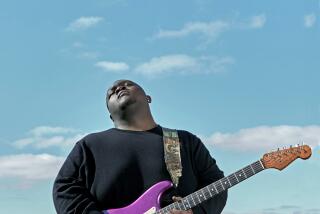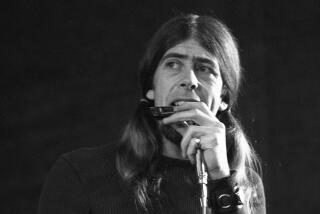Charles McPherson Ever More Potent on His Jazzy Alto Sax
Artistically speaking, Charles McPherson--the modern-jazz alto saxophonist with the diamond-bright sound--says his life has never been better.
“I’m more potent musically, and I’m having more fun too,” he said in a phone conversation from the San Diego home he shares with his wife, Lynn, and their 7-month-old daughter, Camille.
McPherson appears Friday and Saturday with his quartet at the Club Brasserie in the Bel Age Hotel in West Hollywood.
“Now I’m thinking about why I play the notes I play. As a youngster, I was groping around, trying to find out what to play,” said McPherson, 53, speaking in a typically enthusiastic manner. “But, hopefully, if you live long enough, you experience all the emotions that humans feel, and you get more depth of feeling. I cry easier now than when I was 25. I can cry at the drop of a hat, and I’m not ashamed about it. I can also laugh more; I can hurt more. I think the whole emotional spectrum is enhanced.”
The process of transposing these emotions into his art is his goal as a musician, McPherson said. “Then you have played your spirit, you have manifested it in three dimensions. You have made the inner become the outer,” he said. “If you can do that, that’s wonderful, that’s the whole fun of playing. That’s why I play music.”
McPherson, a devoted disciple of the great Charlie (Bird) Parker, the principal innovator of be-bop, has to be considered one of the finest exponents of Bird’s style.
He lives comfortably, and works, though not enough to his liking, at least consistently, occasionally leading his quartet as well as traveling to New York or to Europe as a single. There, he appears, as do numerous jazzmen these days, with local rhythm sections.
Despite his relative prominence and critical acclaim, McPherson is faced with a frustrating situation: He has been without a record deal for several years. In the past, first-rate albums by him appeared on the Prestige, Mainstream and Discovery labels. But he produced his most recent CD, “Illusions in Blue,” himself. (It is available at his engagements and by mail from Chazz Jazz, 3679 Bellingham Ave., San Diego 92104. CDs are $16.50, cassettes, $11.50.)
McPherson cites a variety of reasons for his lack of a recording contract. His age, he said, places him outside the demographics that seem to drive American marketing. “It’s like if you’re not in your 20s, then what you do is not worth a damn,” he said with an edge in his voice. “If you’re a serious artist, you should be recognized, no matter how old you are. There are a lot of young people getting credit” for playing pure jazz, “but that’s what I’ve always done. I never went the pop route when others did. Guys 21 years old are getting record deals. If I were 21, I’d probably be getting rich from the same thing I’m doing now.”
Nevertheless, he said, the fact that young saxophonists such as Antonio Hart, Christopher Hollyday and Joshua Redman--all in their 20s--have deals with major labels doesn’t make him bitter. “More power to them, but I should have a deal also,” he said.
He feels something else also may have held back his career, both as a recording artist and as a performer. In general, be-bop, which McPherson regards as a high art form, has never been granted that status by a large listening audience.
“That period from 1945 to 1955 was really the greatest musical explosion there ever was, but it was never comprehended by the mass lay public,” he said. “Whenever nostalgic periods are brought up, no one picks that one. Maybe it’s elitist of me, but I feel that if you call yourself an intellectual and you know literature and history, you’ve checked out Henry Miller and Sartre and the philosophers, and you know about Marlon Brando and Laurence Olivier, that if you haven’t checked out Bird, you’re hip to a point, but not hip all the way. To me, Bird represents the epitome of high art.”
McPherson, a native of Joplin, Mo., who grew up in Detroit, was 14 when he first heard Parker. The experience changed his life. “My first impression of Bird was that this is the way music should go. I didn’t know it was a new approach. It just sounded like music to me.”
McPherson saw Parker playing live in Detroit on several occasions and was transfixed not only by Bird’s music but by his onstage demeanor.
“He was the most centered, undistracted person I’ve ever seen play music,” McPherson recalled. “That power of concentration, you could sense it. It was like a laser beam. I got the feeling that this disciplined personality was nothing that he worked on, that it came naturally.”
He emulated Parker but never sounded like a copycat. In fact, McPherson, who gained renown
for his performances with noted bassist-composer Charles Mingus from 1960 to the early ‘70s, has extended Parker’s approach. He calls his own style neo be-bop.
“My music definitely has a be-bop base, but it’s different. It’s a branch of the be-bop tree,” said McPherson. His sets include originals and a be-bop tune or two. “And, of course, the blues,” he added.
At the Club Brasserie, McPherson will be accompanied by Alan Broadbent, piano, Jeff Littleton, bass, and his son, Chuck McPher
son Jr., on drums. He said he loves the way his son plays.
But it wasn’t always that way.
“At first it was like I was working on a job, and he was the foreman. I was the boss’s son,” said the younger McPherson, who has been performing with his father for 14 years. “Now it’s mellow. We played last night, and it was a good experience.”
The public passion for be-bop may never match McPherson’s. “I’m engrossed in this music. It hooked me,” he said. “This thing is not something that makes you rich. As long as I’m comfortable, it’s cool. This music is special, and that’s why I’m doing it.”
Charles McPherson performs Friday and Saturday, 9 p.m. to 1 a.m., at the Club Brasserie, Bel Age Hotel, 1020 N. San Vicente Blvd. (100 feet south of Sunset Boulevard), West Hollywood. No cover, no minimum. (310) 854-1111.
More to Read
The biggest entertainment stories
Get our big stories about Hollywood, film, television, music, arts, culture and more right in your inbox as soon as they publish.
You may occasionally receive promotional content from the Los Angeles Times.








